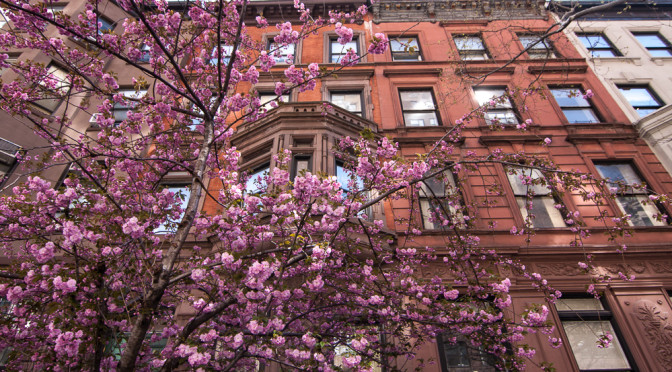It’s not every day that The New York Times calls one for an interview. But I arrived home recently to find a message from Times reporter Sarah Maslin Nir. The topic? Charity house tours in New York City and the potential breach of privacy that cellphone cameras pose to homeowners.
I happened to be writing a piece on house tours across the U.S. and was poking around various websites for details. Spring is peak season so I’d been surprised to find that a few well-known New York tours had yet to confirm for 2016. On the Brooklyn Heights Association’s Facebook page I posted: Hi – Will there be a Brooklyn Heights House Tour this May? If so, what are the dates and contact number for tickets? Thanks, Andrea. While I never heard back from the organizers, I did receive a response from Ms. Nir. She had seen my comment and wondered about my interest.
We spoke at length about the presence of the ubiquitous cell phone camera having a chilling effect on homeowners’ participation. Did I think, she asked, that their reticence was a reasonable response? As a homeowner, community organizer, and writer on the relationship of people to their homes and communities, I said it was. Houses are private property and owners are entitled to their feelings, rational or not. But it took more time than the length of our conversation to fully articulate my thoughts. Are homeowners really worried about photos appearing on the internet, or is their fear based on something more complex? And is ‘security’ and ‘privacy’ code for the end of the traditional house tour in high-net-worth neighborhoods?
I am no fan of the cellphone and support their ban at house tours from the perspective of respect: respect for the homeowners and the experience of other guests. However, I acknowledge this is really a struggle against the explosive growth and adoption of personal technology. We are living through the wild west of rapid technological change with no agreed upon social mores to govern behavior, to determine what is appropriate and inappropriate use. I assume that lawmakers will eventually provide the authority as they have, for example, with texting and driving, and battle cries over a growing Nanny State will sound from sea to shining sea. I am not sure that the simple house tour can survive that kind of fight.
But technology is a distraction, the red herring, for other, more cataclysmic, social shifts.
Where soaring land values are altering neighborhoods beyond recognition, physically and/or sociologically, a house is perceived of as less of a home – a source of belonging in a larger community – and more of a means of wealth creation. According to the Brooklyn Heights Association website: “Only about 49% of residents have lived in their current home for five or more years. Some moved from elsewhere in the Heights or Brooklyn, but it appears that nearly 40% are new to the borough.” Such drastic turnover is bound to create a clash of old and new values, a desire to shake-up the way things have always been done, and to push some people aside. It’s difficult for a community to absorb that much change in so little time and present a unified front.
Social media, reality TV and corporate brands commodify houses and promote designing, building, renovating and flipping properties to the level of bloodsport. We are pressured to get in on the action – to move on and move up – or economically fall behind (and we know, historically, how that’s worked out for many people). The sacred home is reduced to a profane buzzword, masking its true purpose as a critical building block of social cohesion, community stability, and economic, physical and mental health.
With growing economic inequality between the 1% and everyone else, wealth-and philanthro-shaming are actual things and could be considered not only embarrassing, but genuinely threatening. It becomes a practical matter to fly beneath the radar of the angry or displaced, to not provoke their online or physical wrath. It’s safer to shut away one’s house than open it up to who-knows-what.
So, after 30 years of cooperation and generosity on the part of local homeowners, the Brooklyn Heights Association has cancelled its 2016 house tour. Yes, an alternative fundraising opportunity has been proposed, but that is a slap in the face of communal ritual and history. It seems big money – or the problems of having it – changes everything, for everyone involved.
